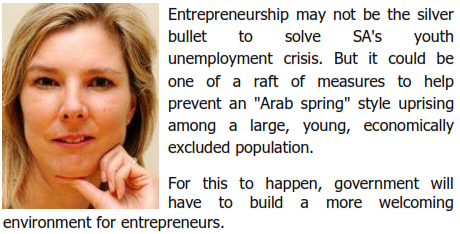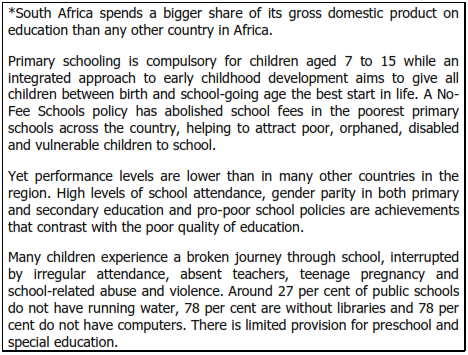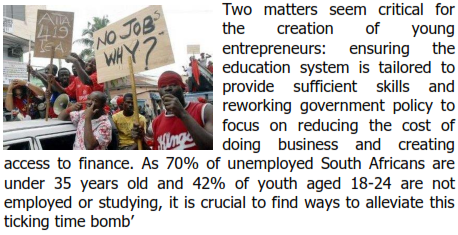CHAPTER 14
Youth unemployment - Is entrepreneurship the answer?
by Gillian Jones, March 05 2013, 10:38

A transformation audit released last week by the Institute for Justice & Reconciliation (IJR) questions whether youth entrepreneurship, as an alternative to formal employment, has been sufficiently exploited to get young people into jobs, especially since job growth in the private and public sectors is slow.
"If one just looks at how many South Africans have out of need created small businesses, I think the ingenuity is there," says the institute's head of policy & analysis, Jan Hofmeyr.
But there are serious obstacles to developing young entrepreneurs. The first is SA's generally poor education system.
"It is unrealistic to expect people with a *bad education to start a business and be successful," says Kobus Engelbrecht, a member of the 2013 Sanlam Business Partners Entrepreneur of the Year judging panel.
The IJR report says there is a strong link between the level of formal education and entrepreneurial activity.

A 2011 Global Entrepreneurship Monitor (Gem) report found that SA's poor education system, low levels of employer support and top-down decision making were primary contributors to the low percentage of the population involved in entrepreneurial activities. Only 7% of South Africans aged 1824 and 10% aged 25-34 were entrepreneurs. This was low compared with other Brics countries, except for Russia.
Then there's the difficulty of gaining access to finance. There are limited options available - the National Youth Development Agency is one of the few institutions to finance youth ventures. But obtaining the funds is often a slow, inefficient process. Finance ranges from R5,000 to R100,000 per venture.
Age may also count against the success of youth entrepreneurs, though there is disagreement on this.
The IJR report finds that young people tend to lack the skills or experience to navigate the business world.
"Though [young people] may earn enough to survive, their ability to move into more sustainable enterprises is hampered by their inexperience and [other] age-related constraints," it says.
The Kauffman index of entrepreneurial activity, a US-based indicator, found that the average age of successful entrepreneurs was 39, as by then people had the advantage of work experience and a network of contacts they had built up over the years. An exception to this was a younger group with successes in information and computing technologies.
Alex Antonites, chair of entrepreneurship at Pretoria University, says in an ideal world it would be better for potential entrepreneurs to have some work experience. "Even working for two or three years as a waiter is a help, but in Africa that is not often possible."
Antonites says young people have two core entrepreneurial skills in their favour that are critical to success: creativity and a willingness to take risks.
What they lack in business skills can be acquired through training, as long as this is very practical, argues Antonites, who is involved in running a business incubator at the University of Pretoria to channel students into startup businesses.
SA should consider piloting business incubators in rural areas under the auspices of the further education & training (FET) colleges, as they now have more capacity, suggests Antonites.
"FETs develop technical skills, and entrepreneurship can link up with that to create technical businesses that could create a lot of jobs," he says.
This fits in with Engelbrecht's suggestion. He says that, considering the shortage of artisans in SA, the most promising area for creating successful young entrepreneurs is in the trades.
"Entrepreneurs don't have to invent rockets to go to outer space; they should just look at the basic stuff people need. If youths focus on that and do it well, they will have a successful business."
One of the unintended consequences of black economic empowerment policies has been the inhibition of entrepreneurial activity among black youths. The IJR report says companies are willing to pay a premium to attract black employees. This entices them away from the risk and difficulty of starting their own businesses.
The number of black business owners, particularly those with tertiary qualifications, is lower than business owners with similar qualifications from other race groups, according to the report. This is of concern, as people with a tertiary qualification are more likely to start an opportunity-motivated business than a business motivated by necessity.
Necessity businesses, started out of desperation by people who can't find alternative employment, generally provide only enough income to employ one person.
According to the Gem report, the more people in a country involved in opportunity entrepreneurship, the greater the level of economic development.
In Gem's previous report, which came out in 2005, it found that almost a third of necessity firms had no employees. The average number of jobs created per firm was 1,6. In contrast, the average number of employees at opportunity firms was 4,4.
But another difficulty facing SA's efforts to create young entrepreneurs is attitude. According to the IJR report, willingness to accept the possibility that a business will fail is a good indicator of entrepreneurial capacity. But 40% of young South Africans say fear of failure is a strong inhibiting factor in deciding to start their own business, with black and coloured youths the most inhibited.
This suggests that even before fixing policy, SA needs to address this aspect .
The IJR report questions whether the SA education system is appropriate to developing entrepreneurs, especially given SA's weakness in maths and science. Aligned to this is the increasing importance of access to technology, both for starting a new business and for existing companies to stay competitive. This points to the importance of teaching pupils the necessary technical skills at school and giving them access to technology.







